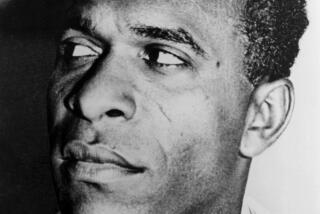History Haunts the Quick and the Dead
- Share via
The Holocaust is put to use as a kind of icon in the pages of “The Far Euphrates,” a spare but affecting first novel by Aryeh Lev Stollman. Twins and Gypsies, two of the lesser-known victims of torture and death at the hands of the Nazis, are briefly and obliquely invoked as emblems of separation and suffering, as if to illustrate the aphorism uttered by a concentration camp survivor named Jean Amery: “Anyone who has been tortured remains tortured.”
But the real focus of the novel is Stollman’s alter ego, a pampered young man named Alexander who may be haunted by history but is even more fascinated with himself. As he muses over the experiences of his childhood and adolescence, Alexander is given to flights of fancy, which explain why his doting mother complains, “he is too much of a dreamer.”
“Eventually and I suppose inevitably, I myself became an object of study,” Alexander says of himself. “I stood and examined the container of my soul carefully in the closet mirror.” What he hopes to find are “those most personal and valuable of treasures, our accumulated knowledge and memory,” which “are locked away, held prisoner within the disintegrating vault that is our corporeal selves.”
Such grand flourishes are the price of admission to an interior world that the author succeeds in creating, a realm in which even ordinary sights and sounds are made to seem simultaneously enchanted and demonic. Significantly, Stollman is a radiologist at a New York hospital, and his prose functions rather like an X-ray in probing the innermost reaches of body and soul.
When Alexander muses over his father’s passion for the language and culture of long-dead civilizations of the ancient Near East, the whole scholarly enterprise seems like a quest for some marvelous but forbidden knowledge, and ordinary correspondence from fellow scholars turns into powerful talismans. “I could hold them up to the light of a window,” Alexander rhapsodizes over the envelopes that arrived in the mail, “and see my fingers on the other side, transilluminated by a universally shining sun.”
In fact, the dreamy young Alexander is wandering toward a revelation that will shatter the facade of order and certainty that his parents have struggled so hard to maintain. Death begins to intrude into the here and now of his childhood in the Canadian border town of Windsor: Someone begins to kill and mutilate dogs in the neighborhood, a couple of children are killed in their own backyards in a freak automobile accident, a dying girl summons him to her bedside--and somehow all of these horrors are linked in ways that he can only dimly understand.
When Alexander slips into what may be a nervous breakdown, he imagines himself entering an exalted mystical state. He believes that he is the almighty at the moment of creation when “He withdrew into Himself,” contracting “His very being, and [making] within Himself an isolated place in which to set his universe.” It is a notion, he explains, that draws upon traditions of cabalism that he explored in his father’s library.
Whether Alexander’s spiritual crisis leads him to clinical depression or divine insight, the result is a flash of enlightenment in which all of the darkest mysteries are revealed. One of the revelations about a kindly old cantor and his tormented twin sibling is so unexpected, so horrific, that they caused my heart to race and my skin to crawl.
Every secret struggles to reveal itself, as Isaac Bashevis Singer once observed, and so it is in “The Far Euphrates.” “There are no secrets here,” says an unlikely character named Mademoiselle Dee Dee, a woman who turns out to be the gatekeeper to even more remote and forbidden worlds than the one that Alexander inhabits. “All secrets contain the seeds of death.”
More to Read
Sign up for our Book Club newsletter
Get the latest news, events and more from the Los Angeles Times Book Club, and help us get L.A. reading and talking.
You may occasionally receive promotional content from the Los Angeles Times.










